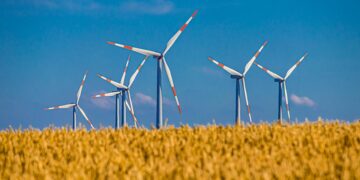Powering the Future: Why Renewable Energy is Vital for a Sustainable World
As the world faces increasing challenges related to climate change and environmental degradation, the need for sustainable energy sources has never been more urgent. Renewable energy offers a viable solution to these pressing issues, providing a cleaner, more sustainable alternative to fossil fuels. In this article, we will explore the importance of renewable energy in powering the future and creating a more sustainable world.
The Benefits of Renewable Energy
Renewable energy sources, such as solar, wind, hydro, and geothermal power, offer a wide range of benefits over traditional fossil fuels. One of the most significant advantages of renewable energy is its environmental sustainability. Unlike fossil fuels, which emit harmful greenhouse gases and contribute to air pollution, renewable energy sources produce minimal to no emissions, making them a cleaner and more environmentally friendly option.
In addition to being better for the environment, renewable energy sources are also more sustainable in the long term. Fossil fuels are finite resources that will eventually run out, leading to energy shortages and higher costs. In contrast, renewable energy sources are abundant and inexhaustible, ensuring a reliable and consistent energy supply for generations to come.
Furthermore, renewable energy sources offer economic benefits as well. The renewable energy industry has seen tremendous growth in recent years, creating jobs and stimulating economic development in communities around the world. By investing in renewable energy, countries can reduce their dependence on imported fossil fuels, improve energy security, and boost their economies.
Addressing Common Questions About Renewable Energy
1. Is renewable energy reliable?
One common misconception about renewable energy is that it is not as reliable as traditional fossil fuels. While it is true that renewable energy sources can be intermittent, advancements in technology have made it possible to overcome these challenges. For example, energy storage solutions, such as batteries, can store excess energy generated by renewable sources for use during times when the sun is not shining or the wind is not blowing. Additionally, smart grid technologies can help balance supply and demand, ensuring a reliable and stable energy supply.
2. Are renewable energy sources expensive?
Another common concern about renewable energy is that it is more expensive than traditional fossil fuels. While the upfront costs of renewable energy systems may be higher, the long-term benefits far outweigh the initial investment. As technology continues to improve and economies of scale are realized, the cost of renewable energy is steadily decreasing. In fact, in many cases, renewable energy is already cost-competitive with fossil fuels, making it a viable and affordable option for consumers and businesses alike.
3. Can renewable energy replace fossil fuels entirely?
While it may not be feasible to completely replace fossil fuels with renewable energy sources overnight, the transition to a more sustainable energy system is both necessary and achievable. By investing in renewable energy and implementing policies that support its growth, countries can gradually reduce their reliance on fossil fuels and transition to a cleaner, more sustainable energy future. With continued innovation and commitment to renewable energy, it is possible to create a world powered entirely by clean, renewable sources.
The Role of Renewable Energy in a Sustainable World
Renewable energy plays a crucial role in creating a more sustainable world by reducing greenhouse gas emissions, mitigating climate change, and promoting environmental conservation. By shifting away from fossil fuels and embracing renewable energy sources, we can significantly reduce our carbon footprint and lessen our impact on the planet.
Furthermore, renewable energy offers a path to energy independence and security, reducing our dependence on volatile global oil markets and geopolitical conflicts. By diversifying our energy sources and investing in local, renewable resources, countries can enhance their energy resilience and ensure a stable and secure energy supply for the future.
In conclusion, renewable energy is vital for powering the future and creating a more sustainable world. By investing in renewable energy sources, countries can reduce their environmental impact, stimulate economic growth, and secure a reliable and sustainable energy supply for generations to come. The transition to renewable energy is not only necessary but also achievable, with numerous benefits for both people and the planet. It is time to embrace renewable energy and pave the way for a cleaner, more sustainable future.












